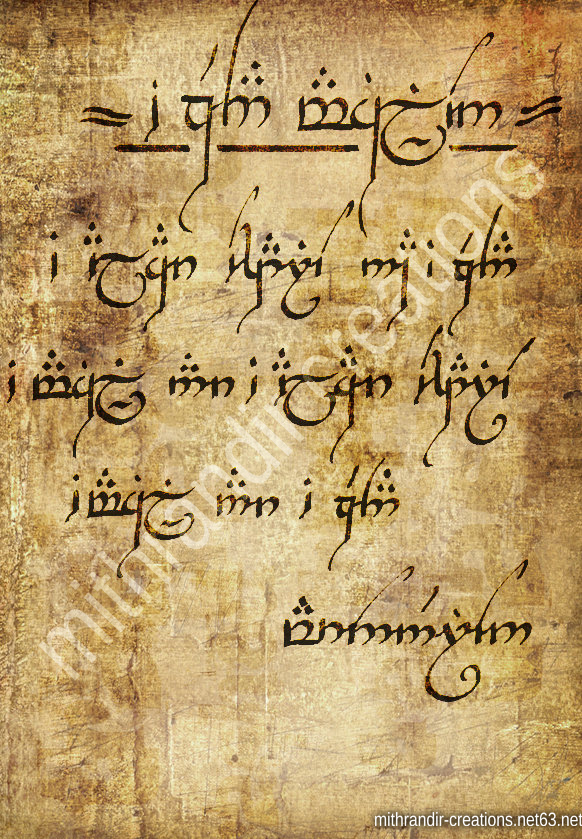Elusah meaning Voice of Songs in Elvish was considered the mother tongue of the Elves long before their arrival in Dageth as refugees after the collapse of the Unified Elven Empire. The language, itself, was said to almost sound like music, and all Elves spoke it to signify their unity. The only problem was that the language was hard to understand for those who did not speak it. It was also difficult to read as complex letters could only be deciphered by the Elves, themselves.
A language Lost
Though the Elusah would be still be used by the
Elves for a time when they were still a unified people on the Dageth, the discovery of magic and what would lead to the War of Light and Dark and the event that would lead to the
Awakening would see an end to it. With the
Elves being divided into different species from the magic that they once tried to control and the stopping of their immortality caused them to scatter across the land with the ancient Elves that lived for millennia dying out the newer generations began to alter it to suit their need with much of the original dialect being lost to say a select few and much of its writing from conflicts that would push them farther away from their past.
Unreadable Texts
Due to Elusah being no longer used by anyone anymore anything that has been written down in the language is considered unreadable. Which is even more frustrating to
Humans in the
Western Lands as any knowledge that the
Elves had left behind has been lost to the ages to them with what little they could find. The
Elves themselves have had trouble as well as the writing in their language has become difficult to understand as their alphabets have changed tremendously cause them to lose whatever knowledge lost to them as well as very few people can even write it anymore.
Natively known as: Elusah /ˈɣlʊhviːŋks/
...and he stood holding his hat and turned his wet face to the wind...
mēyy kwū dfūnflō zēb sō lyīlk mēyy kmikō sō syōsp kindz bwenk yo
Pronunciation: /meːjj kwuː ˈdfuːnfloː zæːb soː ljiːlk meːjj ˈkmɪkoː soː sjoːsp kɪndz bwænk jɔ/
Gluhvīngksian word order: and he stood holding hat his and turned his face wet the wind to
Spelling & Phonology
Consonant inventory: /b d f h j k l m n p s t v w z ð ŋ ɣ θ/
| ↓Manner/Place→ | Bilabial | Labiodental | Dental | Alveolar | Palatal | Velar | Glottal |
|---|
| Nasal | m | | | n | | ŋ | |
| Stop | p b | | | t d | | k | |
| Fricative | | f v | θ ð | s z | | ɣ | h |
| Approximant | | | | | j | | |
| Lateral approximant | | | | l | | | |
Co-articulated phonemes
| ↓Manner/Place→ | Labial-velar |
|---|
| Approximant | w |
Vowel inventory: /a aː eː iː oː uː æ æː ɔ ɪ ʊ/
| Front | Back |
|---|
| High | iː | uː |
| Near-high | ɪ | ʊ |
| High-mid | eː | oː |
| Low-mid | | ɔ |
| Near-low | æː æ | |
| Low | a aː | |
Syllable structure: (C)(C)(C)V(C)(C)(C)
Stress pattern: No fixed stress
Word initial consonants: b, bl, bn, bw, d, df, dl, dv, dvj, fl, hj, j, k, kh, kl, km, kn, ks, kst, kw, lj, m, mj, ml, n, nj, nw, pj, pl, s, sj, sl, sn, sw, th, tm, tsv, tv, v, vj, vl, vn, vw, w, z, zj, zn, zw, ð, ŋ, ŋw, ɣ, ɣl, θ, θl
Mid-word consonants: b, bd, bl, bst, bt, bvj, bw, d, dkw, dl, dn, ds, f, fd, ff, fk, fl, fp, fst, ftl, ftw, fw, h, hb, hd, hl, hv, hw, j, jb, jdn, jf, jj, jk, jsk, jt, jvj, jz, k, kb, kd, kj, kkj, kkw, kn, ksf, ksj, ksk, ksm, ksp, kst, ksw, ktf, ktl, kts, kv, l, lb, ld, ldf, ldh, ldl, ldn, lf, lfd, lfm, lft, lkj, llv, lmn, lp, lpf, lpl, lsh, lsk, lst, lt, ltj, lts, ltz, lv, lð, lθ, m, mbj, mbl, mfl, mft, mnd, mp, mpf, mpj, mpl, mpt, ms, mst, n, nb, nbl, nd, ndb, ndf, ndj, ndk, ndl, ndm, ndn, nds, ndt, ndz, nf, nfj, nfl, nj, nkj, nkl, nkt, nkw, nlj, nm, nmj, nnj, npj, npl, ns, nsf, nsj, nsk, nsl, nsm, nsp, nst, ntb, ntf, nth, ntj, ntk, ntl, ntm, nts, ntv, ntw, nzl, nzp, nð, nɣ, nθj, nθl, p, pk, pl, plw, pn, ppl, ps, psj, pst, pw, pz, s, sb, sd, sf, sh, skj, skl, skv, sp, spj, spl, st, stf, stj, stk, stl, stm, stn, stv, stw, sz, sθ, t, tb, tbl, td, tlm, tm, ts, tsd, tsj, tsm, tst, tth, tts, tv, tw, tz, v, vd, vl, w, wk, wl, ws, wts, wv, ww, z, zb, zd, zdv, zh, zk, zm, zn, zp, zv, zz, ð, ðst, ŋ, ŋb, ŋd, ŋh, ŋkf, ŋkj, ŋkl, ŋkn, ŋkt, ŋkw, ŋkθ, ŋl, ŋm, ŋmj, ŋn, ŋtj, ŋts, ŋɣn, ɣ, θ, θd, θkw, θw
Word final consonants: b, bb, d, ft, fts, jd, jj, jl, js, jt, kt, kts, l, ldz, lk, ll, lps, lpt, ls, lt, lts, lθ, m, mp, mpf, mps, mpt, ms, mt, mz, n, ndd, ndl, nds, ndz, nf, nk, nkt, ns, nt, ntl, nts, nv, nz, p, pp, pt, pts, s, sks, skt, sp, spt, st, sts, t, tt, v, vd, w, wf, ws, z, zd, zt, ðd, ŋ, ŋd, ŋk, ŋks, ŋkt, ŋkθ, ŋn, ŋt, ŋz, ɣ, θ
Phonological changes (in order of application):
- p → f / V_V
- {m,n} → ŋ / _k
- s → ʂ / _t
- {m,n} → ŋ / _k
Spelling rules:
| Pronunciation | Spelling |
|---|
| æ | e |
| ɪ | i |
| ɔ | o |
| ʊ | u |
| j | y |
| ŋ | ng |
| ɣ | g |
| θ | th |
| ð | dh |
| V₁ː | V₁̄ |
Grammar
Main word order: Subject Verb Object (Prepositional phrase). "Mary opened the door with a key" turns into
Mary opened the door with a key.
Adjective order: Adjectives are positioned after the noun.
Adposition: postpositions
Nouns
| Singular | No affix
dfīi /dfiːˈɪ/
dog
|
| Plural | If starts with vowel: Prefix w-
Else: Prefix weː-
wēdfīi /ˈweːdfiːɪ/
dogs
|
Articles
| Definite | zyom /zjɔm/
the
|
| Indefinite | dvō /dvoː/
a, some
|
Uses of definite article that differ from English:
- Used to talk about countable nouns in general: English’s ‘I like cats’ would translate to ‘I like the cats’
- Used with place names: ‘The London’
Uses of indefinite article that differ from English:
- Not used for non-specific countable nouns: non-specific means ‘I am looking for a (any) girl in a red dress’, whereas specific means ‘I am looking for a (particular) girl in a red dress’
- Not used for non-specific mass (uncountable) nouns: non-specific means ‘Would you like some (any) tea?’ whereas specific means ‘Some tea (a specific amount) fell off the truck’
Pronouns
| 1st singular | gīs /ɣiːs/
I, me, mine
|
| 2nd singular | dvye /dvjæ/
you, yours
|
| 3rd singular masc | kwū /kwuː/
he, him, his, it, its
|
| 3rd singular fem | a /a/
she, her, hers, it, its
|
| 1st plural inclusive | nuz /nʊz/
we (including you), us (including you), ours (including you)
|
| 1st plural exclusive | myēnts /mjeːnts/
we (excluding you), us (excluding you), ours (excluding you)
|
| 2nd plural | sli /slɪ/
you all, yours (pl)
|
| 3rd plural | hyi /hjɪ/
they, them, theirs
|
Possessive determiners
| 1st singular | zē /zæː/
my
|
| 2nd singular | wēw /weːw/
your
|
| 3rd singular masc | sō /soː/
his
|
| 3rd singular fem | wēngt /weːŋt/
her
|
| 1st plural inclusive | sli /slɪ/
our (including you)
|
| 1st plural exclusive | flē /flæː/
our (excluding you)
|
| 2nd plural | yā /jaː/
your (pl)
|
| 3rd plural | ī /iː/
their
|
Verbs
| Singular | Plural |
|---|
| Present | Prefix ɪ-
ikans /ˈɪkans/
(I/you/he/she) learns
| Prefix pjæ-
pyekans /pjæˈkans/
(we/they) learn
|
| Past | Prefix aː-
ākans /ˈaːkans/
(I/you/he/she) learned
| If starts with vowel: Prefix lj-
Else: Prefix ljuː-
lyūkans /ˈljuːkans/
(we/they) learned
|
| Remote past | If starts with vowel: Prefix th-
Else: Prefix tha-
thakans /ˈthakans/
(I/you/he/she) learned (long ago)
| If starts with vowel: Prefix v-
Else: Prefix vɔ-
vokans /vɔˈkans/
(we/they) learned (long ago)
|
| Future | Prefix ða-
dhakans /ðaˈkans/
(I/you/he/she) will learn
| Prefix njaː-
nyākans /njaːˈkans/
(we/they) will learn
|
Numbers
Gluhvīngksian has a base-20 number system:
1 -
kstēnts
2 -
myēnts
3 -
blō
4 -
ingkwī
5 -
vwā
6 -
slo
7 -
kwō
8 -
ki
9 -
tve
10 -
bwe
11 -
kingdi
12 -
sōng
13 -
āngt
14 -
web
15 -
thongktandz
16 -
ivd
17 -
zunthya
18 -
istha
19 -
myaldz
20 -
yoms
21 -
yomskstēnts “twenty-one”
400 -
kstēnts ātthenfē “one fourhundred”
401 -
kstēnts ātthenfē kstēnts “one fourhundred one”
800 -
myēnts ātthenfē “two fourhundred”
8000 -
kstēnts klīngk “one eightthousand”
Derivational morphology
Adjective → adverb = If starts with vowel: Prefix v-
Else: Prefix vɔ-
Adjective → noun (the quality of being [adj]) = Prefix vɔ-
Adjective → verb (to make something [adj]) = Prefix eː-
Noun → adjective (having the quality of [noun]) = If starts with vowel: Prefix w-
Else: Prefix wæ-
Noun → adjective relating to noun (e.g. economy → economic) = If starts with vowel: Prefix ð-
Else: Prefix ða-
Noun to verb = If starts with vowel: Prefix ɣ-
Else: Prefix ɣiː-
Verb → adjective (result of doing [verb]) = If starts with vowel: Prefix mj-
Else: Prefix mja-
Tending to = If starts with vowel: Prefix ɣ-
Else: Prefix ɣiː-
Verb → noun (the act of [verb]) = If starts with vowel: Prefix pl-
Else: Prefix pluː-
Verb → noun that verb produces (e.g. know → knowledge) = If starts with vowel: Prefix d-
Else: Prefix doː-
One who [verb]s (e.g. paint → painter) = Prefix a-
Place of (e.g. wine → winery) = Prefix slɪ-
Diminutive = Prefix ɔ-
Augmentative = Prefix næː-





Wow! This is amazingly in-depth. Good job!
I think the only other feedback I can give is that there's a few grammatical errors that can be quickly corrected (take the first paragraph as an example): Elusah meaning Voice of Songs in Elvish was considered the mother tongue of the Elves long before before their arrival in Dageth as refugees after the collapse of the Unified Elven Empire. The language, itself, was said to almost sound like music, and all Elves spoke it to signify their unity. The only problem was that the language was hard to understand for those who did not speak it. It was also difficult to read as complex letters could only be deciphered by the Elves, themselves. Really interesting article.